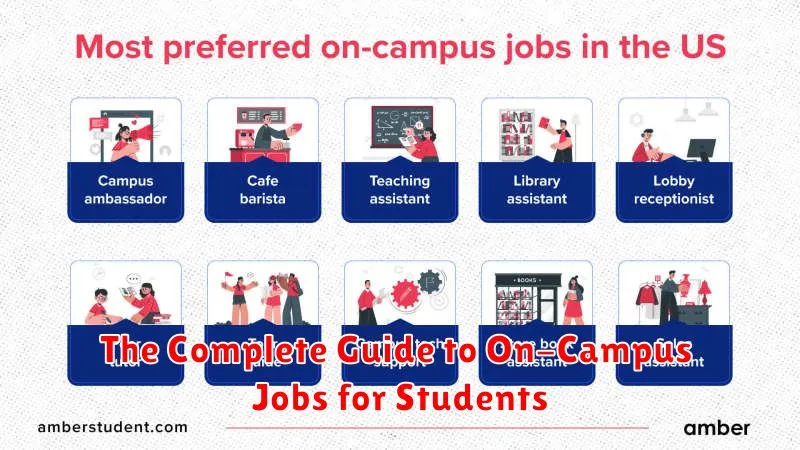Juggling academics and finances can be a significant challenge for many students. Securing an on-campus job offers an excellent solution, providing valuable income while maintaining a healthy balance between work and study. This comprehensive guide explores the world of student employment directly on campus, offering practical advice, tips, and resources to help you navigate the process from application to thriving in your chosen role. Whether you’re seeking part-time work, a work-study opportunity, or ways to gain professional experience, this guide will equip you with the knowledge needed to find the perfect on-campus job.
From navigating the application process to understanding the benefits of on-campus employment, this guide covers everything you need to know. Learn about the various job types available on campus, including research assistant positions, library jobs, administrative roles, and more. We will delve into the benefits of working on campus, such as flexible work hours, convenient locations, and opportunities for professional development. Discover how on-campus jobs can boost your resume, enhance your skills, and provide valuable networking opportunities within your university community. Start your journey to finding the ideal student job with this complete guide to on-campus employment.
Benefits of On-Campus Jobs
On-campus jobs offer numerous advantages for students. Earning money is a primary benefit, helping students cover expenses and reduce reliance on loans. On-campus jobs also offer valuable work experience relevant to future career paths.
Convenience is another key perk. Students can easily fit work into their academic schedules, as on-campus jobs often offer flexible hours. Furthermore, these positions provide opportunities for professional development, allowing students to build skills like time management and communication.
Finally, on-campus jobs can contribute to a student’s sense of community by fostering connections with faculty, staff, and fellow students.
Types of Campus Jobs Available
Campus jobs offer a variety of roles catering to diverse skills and interests. Administrative positions involve clerical work, data entry, and assisting staff. Library jobs can include shelving books, assisting patrons, and research support.
Teaching Assistant positions provide valuable experience aiding professors with grading, tutoring, and lab sessions. Research Assistant roles allow students to contribute to faculty research projects. Other options include IT support, campus tour guides, and student center staff.
Where to Find Your On-Campus Job
Securing an on-campus job often begins with knowing where to look. Your college’s career services office is an excellent starting point. They typically maintain a database of available positions and can offer guidance on the application process.
Departmental websites are another valuable resource. Many departments directly advertise student positions. Check the websites of departments you’re interested in working for.
Student activity centers and campus bulletin boards often post job openings. These postings can range from work-study opportunities to part-time positions in dining services or campus recreation.
Understanding Work-Study Programs

Work-study is a federally funded program that provides part-time jobs for students with financial need. It allows them to earn money to help pay for education expenses. Eligibility is determined by the FAFSA.
Key features of work-study include earning a minimum wage, working on or off-campus (often in roles related to their field of study), and having earnings paid directly to the student or applied towards tuition.
How to Apply and Interview
Applying for on-campus jobs usually involves submitting a resume and cover letter through the university’s job portal or directly to the hiring department. Carefully review the job description and tailor your application materials to highlight relevant skills and experience.
The interview process may vary depending on the position. Be prepared for both behavioral questions (exploring your past experiences) and technical questions (assessing your skills for the specific role). Dress professionally, research the department beforehand, and prepare thoughtful questions to ask the interviewer.
Balancing Work and Study
Successfully balancing work and study requires careful planning and strong time management skills. Prioritize your academic commitments and allocate specific time slots for studying, attending classes, and completing assignments.
Create a realistic work schedule that complements your academic timetable. Avoid overcommitting to work hours, especially during busy exam periods. Effective time management is key to avoiding burnout and maintaining academic performance.
Regularly evaluate your workload and adjust your schedule as needed. Seek support from academic advisors or student services if you’re struggling to manage your time effectively. Remember, maintaining a healthy balance between work and study is crucial for academic success and overall well-being.
Handling Taxes and Paychecks
Understanding your paycheck and tax obligations is crucial for any on-campus job. Taxes will likely be withheld from your earnings, including federal income tax, state income tax (where applicable), and FICA taxes (Social Security and Medicare).
Your paychecks might be distributed physically or through direct deposit. Review your pay stub carefully to ensure accuracy in hours worked and deductions. W-2 forms are provided annually, summarizing your earnings and withheld taxes for the year. These are essential for filing your income tax return.
Building Resume Experience
On-campus jobs offer valuable opportunities to build a strong resume, even with limited prior work history. They provide practical experience and demonstrate a willingness to take initiative.
Participating in student employment allows you to develop transferable skills, such as communication, teamwork, and time management, highly sought after by employers. These roles also provide a chance to explore different career paths and gain relevant industry experience within a supportive environment.
By highlighting your on-campus job experience effectively on your resume, you can showcase your dedication and professionalism to potential employers after graduation.
Rules for International Students
International students on an F-1 visa face specific regulations regarding on-campus employment. Employment is limited to 20 hours per week while classes are in session. During official school breaks, like summer or winter vacation, students may work full-time on campus.
All on-campus jobs must be authorized by the Designated School Official (DSO). Students must maintain valid F-1 status to remain eligible for employment. Working off-campus without proper authorization is a serious violation of visa status.
Common Mistakes to Avoid
Securing an on-campus job can greatly benefit students, but certain missteps can hinder your success. Avoid these common errors to improve your chances.
Applying Late: Many on-campus positions have deadlines. Don’t wait until the last minute. Apply early to demonstrate your interest and preparedness.
Generic Applications: Tailor your resume and cover letter to each specific job. Highlight relevant skills and experiences that match the position’s requirements.
Lack of Preparation: Research the department and role you are applying for. Prepare thoughtful answers to common interview questions. Practice your responses beforehand.
Unprofessionalism: Present yourself professionally in all interactions, from application submission to the interview. This includes appropriate attire, punctuality, and respectful communication.

